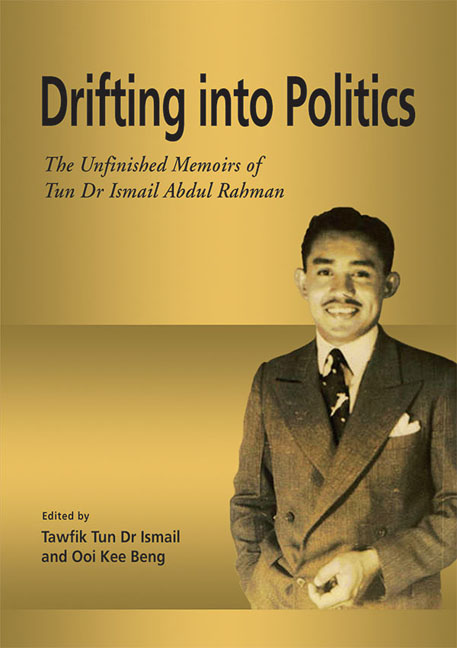Book contents
- Frontmatter
- Contents
- Preface
- INTRODUCTION
- CHRONOLOGY of Tun Dr Ismail bin Datuk Haji Abdul Rahman's Life (From The Reluctant Politician)
- REVIEW of The Reluctant Politician: Tun Dr Ismail and His Time (From Journal of the Malaysian Branch of the Royal Asiatic Society)
- Drifting into Politics: The Unfinished Memoirs of Tun Dr Ismail Abdul Rahman
- Chapter One
- Chapter Two
- Chapter Three
- Chapter Four
- Chapter Five
- Chapter Six
- Chapter Seven
- Chapter Eight
- Chapter Nine
- Chapter Ten
- Chapter Eleven
- Chapter Twelve
- Chapter Thirteen
- Chapter Fourteen
- Chapter Fifteen
- Chapter Sixteen
- Further Notes (30 March 1970)
- Further Notes (26 October 1972)
- Index
- About the Editors
Chapter Twelve
from Drifting into Politics: The Unfinished Memoirs of Tun Dr Ismail Abdul Rahman
Published online by Cambridge University Press: 19 May 2017
- Frontmatter
- Contents
- Preface
- INTRODUCTION
- CHRONOLOGY of Tun Dr Ismail bin Datuk Haji Abdul Rahman's Life (From The Reluctant Politician)
- REVIEW of The Reluctant Politician: Tun Dr Ismail and His Time (From Journal of the Malaysian Branch of the Royal Asiatic Society)
- Drifting into Politics: The Unfinished Memoirs of Tun Dr Ismail Abdul Rahman
- Chapter One
- Chapter Two
- Chapter Three
- Chapter Four
- Chapter Five
- Chapter Six
- Chapter Seven
- Chapter Eight
- Chapter Nine
- Chapter Ten
- Chapter Eleven
- Chapter Twelve
- Chapter Thirteen
- Chapter Fourteen
- Chapter Fifteen
- Chapter Sixteen
- Further Notes (30 March 1970)
- Further Notes (26 October 1972)
- Index
- About the Editors
Summary
After the return of the Merdeka mission from London, Malaya was launched into a short period of self-government from 1955 to 1957. Tunku Abdul Rahman became Chief Minister, Razak retained the Ministry of Education and I became Minister of Commerce and Industry.
The main events which dominated this short period of selfgovernment were the Tunku's meeting with Chin Peng and the work of the independent commission on the constitution.
Tunku was anxious for the state of emergency which had plagued Malaya for a decade to be over when independence was declared on 31 August 1957. In order to find out whether this was possible, he argued that it was essential for him to meet Chin Peng, the leader of the Communist Party of Malaya, and have a frank dialogue with him. As was usual when the Tunku decided on taking an unorthodox step to settle a political problem, he met with opposition. In this case, he was opposed by the British and also by many leaders of the Alliance, including myself. We were worried that in his anxiety to end the state of emergency, he might compromise himself to the extent that he might endanger the security of the country when independence was achieved. He was steadfast in his desire to talk with them and could not be dissuaded, so the next best thing was to ensure that when the meeting took place, the Tunku was well briefed and his security not endangered. Tunku himself was adamant that a safe passage be guaranteed for Chin Peng and his aides. It says much for the trust that Chin Peng had in the Tunku that he accepted the invitation to meet the Tunku knowing full well that he was throwing himself at the mercy of the Tunku and the British. As is well known by now, Chin Peng rejected Tunku's conditions on the offer of amnesty. For the Tunku, the meeting created a lasting impression. From that day onward, he was convinced that no peace was possible with the communists, and to quote his words, “it is either the communists or me”.
On the political front, the Alliance was busy trying to iron out the differences on communal issues. Hitherto the Alliance had been busy mobilizing the people on an emotional plane to support the cause of independence.
- Type
- Chapter
- Information
- Drifting into PoliticsThe Unfinished Memoirs of Tun Dr Ismail Abdul Rahman, pp. 53 - 58Publisher: ISEAS–Yusof Ishak InstitutePrint publication year: 2015

